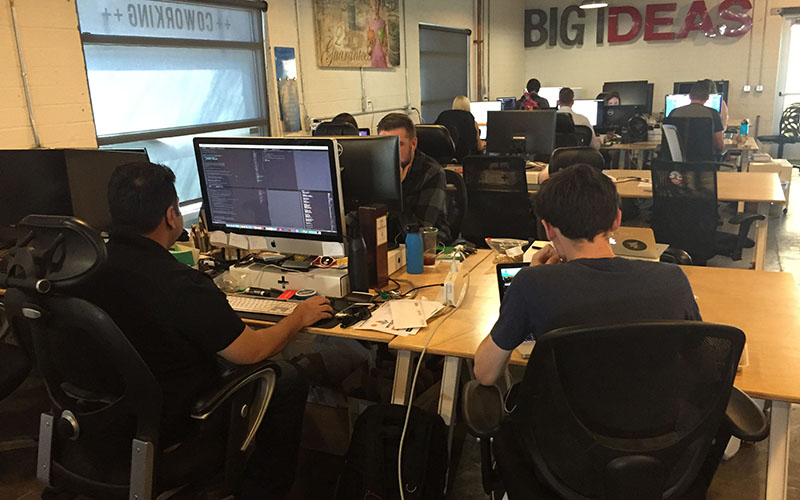
Business Owner Sahil Saini, 29, works at a co-working space in Phoenix. (Photo by Mallory Price/Cronkite News)
Millennials make up more than half of the workforce and are making dramatic changes to the work environment, according to millennials and a national expert.
It is not the workplace that employed their parents, said one Phoenix area employee. Joy Chin said the teamwork and collaboration in her office attracts younger workers.
Shannon Schuyler, a corporate responsibility officer for PricewaterhouseCooper, said Millennials get a bad rap as being lazy, idealistic, and poor communicators. Schuyler spoke about Millennials, born during the early 1980s to the early 2000s, at the GreenBiz conference in Scottsdale. The national sustainability conference is aimed at business executives.
“People have to embrace the tremendous value that this generation brings,” Schuyler said. The Millennial generation “fails fast and tries something new.”
According to a study by Upwork, Millennials have high expectations for job growth, seek alternative work styles and desire flexibility and control at work. That runs counter to several myths about Millennials.
Myth: Twenty-somethings are lazy and not willing to put in the time necessary to get ahead in their careers.
Reality: In the changing workplace, the Millennial generation may not prefer the traditional 9 to 5 shift, but that does not mean that they’re not willing to work hard, said Sahil Saini of Phoenix. The 29-year-old owner of Akos Web Marketing said that he is constantly on call for his clients and employees despite his nontraditional work environment. Saini wakes up every morning at 5 and spends the first three hours of his day researching new trends in technology and entrepreneurship to stay relevant, he said. His office hours are spent at a coworking office where he can collaborate with other business owners.
Nontraditional work hours are characteristic of the Millennial generation because they “want to work hard and they do work hard. They want to be flexible with when and where that work happens,” Schuyler said.
This generation really wants to “own their time and be treated like the professional they are,” she said.
Millennials prefer to cater this free time to their individual interests, she said, and more flexible work shifts are part of their demand.
“Having the flexibility that one person wants time to be able to spend with family and another person wants time because they’re an expert skier,” Schuyler said.
Myth: Millennials are a technological generation that prefers to interact online or by text rather than in person.
Reality: Millennials prefer alternative work spaces that encourage collaboration between employees and supervisors, Schuyler said.
Joy Chin, 22, works in a place quite different than the “head down” work environment of cubicles, she said. She likes that everyone in her office, from sales managers to lower-level recruiters at Insight Global in Scottsdale has the same size desk with low walls. This “creates an environment for creativity and communication,” Chin said.
Chin’s boss doesn’t have a office, she said. “He just sits in the center of our entire office.”
It’s also easier to interact with supervisors. Millennials prefer to get feedback regularly and in person, more so than other generations, Schuyler said. Building relationships with direct supervisors and having in-person conversations about their careers are important.
“That personal connection has become so much more important to Millennials,” Schuyler said.
Myth: Millennials are one uniform group that wants to help change the world.
Reality: Millennials fit into different categories, Schuyler said. Millennials who are leaving college and entering the workforce fall into the transitioning category. They are more concerned about finding a job than changing the world. After the first year and beyond, Millennials begin to question whether their work is really meaningful.
“In the past people were okay with being a cog and being part of that overall machine,” said Schuyler. “The Millennials want to ask ‘why.'”
A company’s purpose is important to Millennials as they move forward in their careers because they were raised to be concerned about their communities and the environment, Schuyler said.
“I’m at a point where I want to do good in the world,” said Alex Figueroa, a social worker at Family Service Agency in Phoenix. The 21-year-old said that happiness and fulfillment are important to her since this will be what she is doing for the rest of her life.